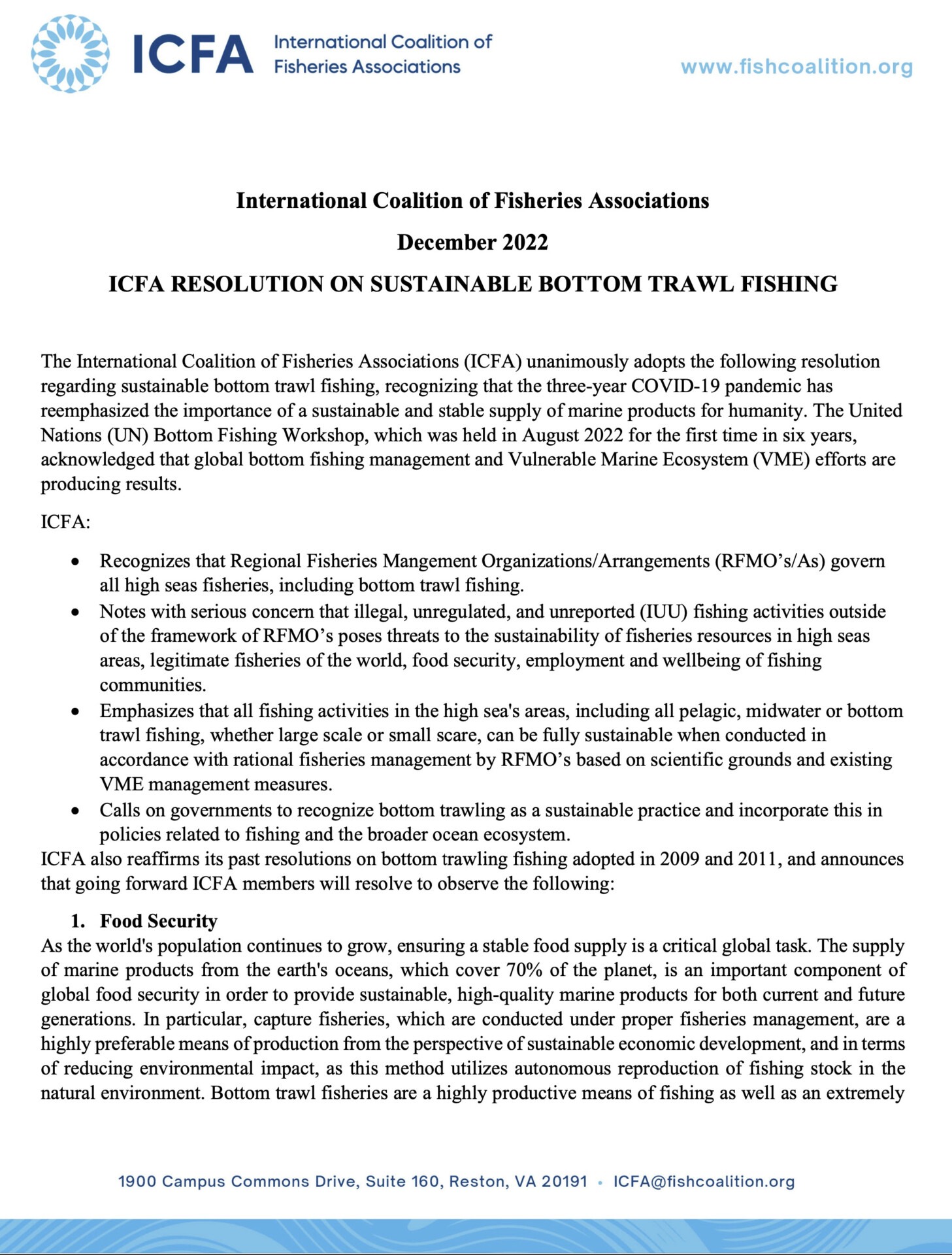ICFA believes that fisheries of all types and sizes, if properly managed, can help contribute to food security, employment, and the poverty eradication. The supply of marine products from the earth’s oceans, which cover 70% of the planet, is an important component of global food security in order to provide sustainable, high-quality marine products for both current and future generations.
ICFA RESOLUTION ON SUSTAINABLE BOTTOM TRAWL FISHING
The International Coalition of Fisheries Associations (ICFA) unanimously adopts the following resolution regarding sustainable bottom trawl fishing, recognizing that the three-year COVID-19 pandemic has reemphasized the importance of a sustainable and stable supply of marine products for humanity. The United Nations (UN) Bottom Fishing Workshop, which was held in August 2022 for the first time in six years, acknowledged that global bottom fishing management and Vulnerable Marine Ecosystem (VME) efforts are producing results.
ICFA:
- Recognizes that Regional Fisheries Mangement Organizations/Arrangements (RFMO’s/As) govern all high seas fisheries, including bottom trawl fishing.
- Notes with serious concern that illegal, unregulated, and unreported (IUU) fishing activities outside of the framework of RFMO’s poses threats to the sustainability of fisheries resources in high seas areas, legitimate fisheries of the world, food security, employment and wellbeing of fishing communities.
- Emphasizes that all fishing activities in the high sea’s areas, including all pelagic, midwater or bottom trawl fishing, whether large scale or small scare, can be fully sustainable when conducted in accordance with rational fisheries management by RFMO’s based on scientific grounds and existing VME management measures.
- Calls on governments to recognize bottom trawling as a sustainable practice and incorporate this in policies related to fishing and the broader ocean ecosystem.
ICFA also reaffirms its past resolutions on bottom trawling fishing adopted in 2009 and 2011, and announces that going forward ICFA members will resolve to observe the following:
- Food Security
As the world’s population continues to grow, ensuring a stable food supply is a critical global task. The supply of marine products from the earth’s oceans, which cover 70% of the planet, is an important component of global food security in order to provide sustainable, high-quality marine products for both current and future generations. In particular, capture fisheries, which are conducted under proper fisheries management, are a highly preferable means of production from the perspective of sustainable economic development, and in terms of reducing environmental impact, as this method utilizes autonomous reproduction of fishing stock in the natural environment. Bottom trawl fisheries are a highly productive means of fishing as well as an extremely effective method for food production. The maintenance and development of this method should therefore be pursued from the perspective of securing efficient food production.
2. Job Creation
(1) Fisheries professionals require specialized technical skills to engage in marine production using sophisticated equipment, tools, and techniques in the natural marine environment. Ensuring that these advanced technical skills are securely passed on to future generations is essential in order to maintain a stable supply of marine products, which constitute a key component of the food security framework of the future.
(2) In addition, the UN Charter calls for the promotion of employment (the UN states the promotion of full employment in Article 55 of the UN Charter, See Appendix 1). Proper consideration should be given to securing the employment and livelihood of fisheries and professionals who contribute to food security.
3. Sustainable Development Goals
As stated in the Sustainable Development Goals (SDGs), ensuring the sustainability of all human activity, while at the same time securing human security, is the most important global goal.
Recognizing that food security, employment, and poverty eradication are integral components of the SDGs, ICFA believes that fisheries of all types and sizes, if properly managed, can help contribute to food security, employment, and the poverty eradication.
We support and respect the guidance by the United Nations Food and Agriculture Organization (FAO) on fisheries policy and science in order to achieve sustainable fisheries, conservation and protection of the marine environment, and optimal use of the marine ecosystem services, including provision of healthy animal protein.
We commit ourselves to supporting and actively contributing to the SDG goals 1 (No Poverty), 2 (Zero Hunger), 8 (Decent Work and Economic Growth), and 14 (Life below Water), among others.
Appendix 1:
Charter of the United Nations
Article 55
With a view to the creation of conditions of stability and well-being which are necessary for peaceful and friendly relations among nations based on respect for the principle of equal rights and self-determination of peoples, the United Nations shall promote:
- higher standards of living, full employment, and conditions of economic and social progress and development;
